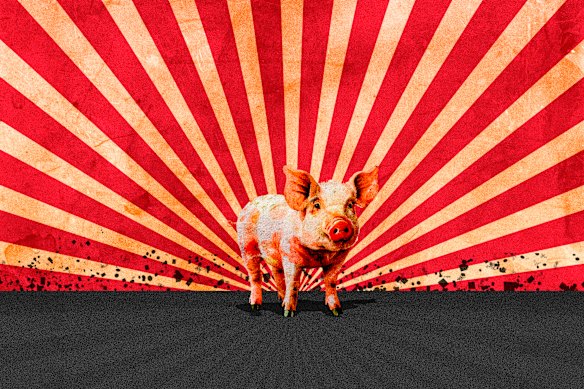
This week marks the 80th anniversary of the publication of George Orwell’s iconic novella, Animal Farm. Released in August 1945, the book has since been hailed as one of Orwell’s finest works, showcasing not only his literary skill but also his critical perspective on power and corruption.
Orwell viewed Animal Farm as his best piece of writing, blending a captivating narrative with sharp political commentary. The story serves as a masterful critique of Stalinism and explores how populist movements can lead to tyranny, a theme that resonates strongly in today’s world. The fable illustrates the dangers of placing unwavering faith in authoritarian leaders, echoing sentiments that can be linked to figures such as Lenin, Stalin, and even contemporary leaders.
A New Creative Direction
When Fredric Warburg, Orwell’s publisher and friend, first read the manuscript, he was astonished. He had known Orwell primarily as a writer of more conventional novels, and the transformation to a poetic and fantastical style in Animal Farm was unexpected. Warburg remarked on how little in Orwell’s earlier works suggested he could produce such a significant literary achievement.
Much of this creative leap can be attributed to Eileen O’Shaughnessy, Orwell’s wife. A talented writer and psychology graduate, Eileen contributed significantly to the development of the story. Her insights into human nature and her appreciation for the animal fable genre influenced Orwell’s work, providing it with a depth of character and emotion that is rarely found in his other writings.
Eileen’s impact on the book is evident through her letters, which reveal her wit and sharp observations of character. Having studied under J.R.R. Tolkien at Oxford, she brought an understanding of narrative and structure that complemented Orwell’s political insights.
Historical Context and Personal Experience
The backdrop of World War II and Orwell’s experiences with totalitarian regimes shaped the writing of Animal Farm. Initially, Orwell intended to write a critical essay on Stalin, but Eileen, who had worked in the censorship department of the Ministry of Information, advised against it, understanding the publication risks associated with such a politically sensitive topic.
Her own experiences with Stalinist spies during the Spanish Civil War provided her with a profound understanding of the oppressive environment Orwell sought to critique. Eileen’s vigilance and strategic thinking helped protect both herself and Orwell from potential persecution, particularly in light of the arrest warrant issued against them by Stalinist operatives.
As they collaborated on the novella, Eileen managed their household amidst wartime hardships, ensuring that Orwell had a supportive environment to create. Their late-night writing sessions, often held in a cold bedroom for warmth, became a testament to their dedication to the craft.
Animal Farm stands apart from Orwell’s other works due to its ensemble cast, featuring a variety of characters, including female figures, rather than the singular disgruntled protagonist typical of his earlier novels. The book’s unique structure and tone—balancing humor with a sympathetic portrayal of character flaws—mark it as a distinct achievement in Orwell’s oeuvre.
As the world reflects on the legacy of Animal Farm, it remains a crucial text for understanding the complexities of power dynamics and the human condition. Its enduring relevance serves as a reminder of the lessons that can be learned from the past, especially in an era where issues of populism and authoritarianism continue to emerge globally.







